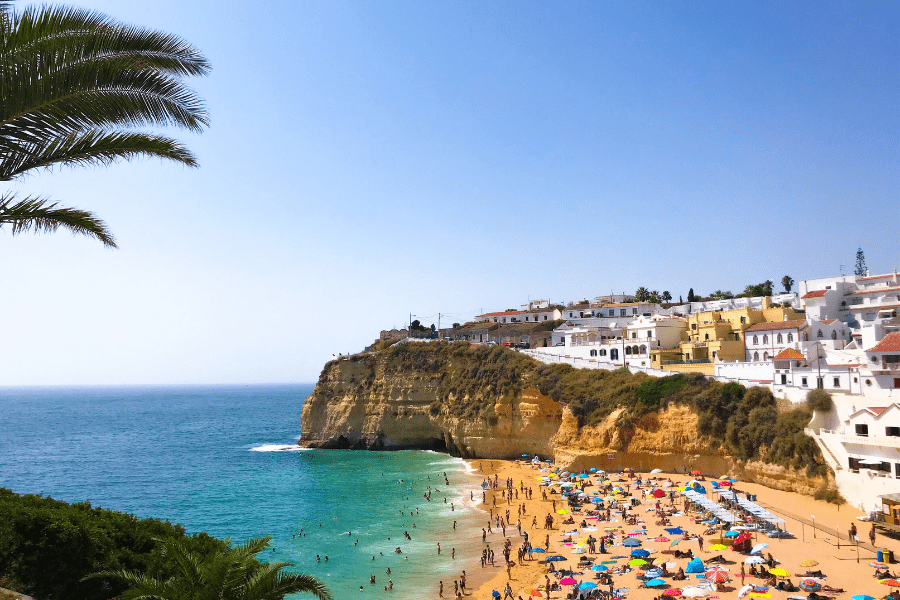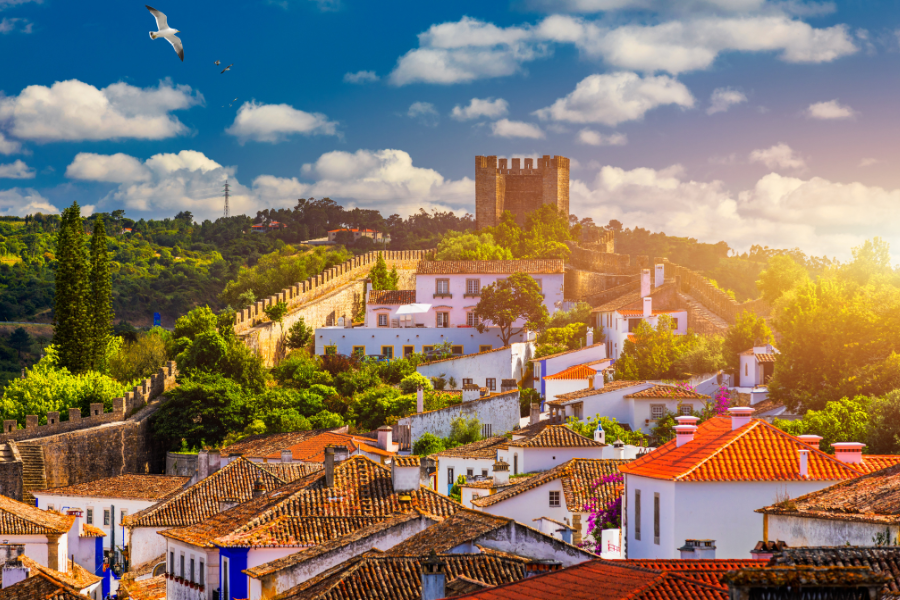How to Establish Portugal Tax Residence in 2025: The Ultimate Guide
April 22, 2025
Portugal has long been one of the best European Union (EU) countries to establish tax residence thanks to its lucrative tax schemes and business-friendly environment. Moreover, its high standard of living and natural beauty make it an excellent location for a second home.
If you’re planning to get Portuguese residency or citizenship, then sorting out your tax affairs is an important step. You definitely don’t want to ignore your tax obligations. And, if you’re moving to Portugal from a less tax-friendly nation, then you’ll want to make sure you qualify for Portuguese tax residency.
Ready to be a tax resident of one of Europe’s best-loved countries and reduce your tax bill? Then, reach out to us. Here at Nomad Capitalist, we’ve helped lots of our clients discover personal and financial freedom in Portugal, and we’d love to do it for you.
There are two ways to become a tax resident of Portugal. You either need to spend more than 183 days in the country each year or maintain a permanent residence there.
Registering with the Portuguese tax authorities is essential once you meet these conditions.
Portugal – Country Overview
Located on the Iberian Peninsula in southwestern Europe, Portugal shares its sole land border with Spain. Its two island chains are autonomous and have their own regional governments.
Portugal’s current population is over 10,500,000; the official language is Portuguese, and the capital Lisbon is the most populous city.
The country is home to 17 UNESCO World Heritage Sites. It boasts diverse terrain and climate with a cold and rocky northern coast and a warm and sunny south.
Portugal – Passport
Our Nomad Passport Index ranks the Portuguese passport as the third-best in the world.
It grants visa-free and visa-on-arrival access to 175 countries. At five years, Portugal’s naturalisation timeline is one of the shortest in Europe, making it an excellent second citizenship option.
Portugal – Economy
Throughout its history, Portugal has experienced plenty of ups and downs. Once one of the wealthiest countries in the world, Portugal’s economy gradually deteriorated, leaving it one of the poorest European countries in the 19th and 20th centuries.
In the late 1990s, Portugal joined the EU (then EEC), after which it experienced reasonable economic growth and high living standards. In 2009, the crisis struck again, but the government promptly took reformative steps to battle it.
Today, Portugal is a developed, high-income country with thriving opportunities and a well-developed service sector.

Overview of Portuguese Tax Rates
Before we explore how to gain Portugal’s tax residency, let’s quickly cover the country’s tax rates and rules.
One significant change to note about Portugal’s tax system in 2024 is the ending of the Non-Habitual Residence (NHR) program for new applicants, which previously offered tax benefits to foreign residents. If you’re still under the NHR scheme, you will continue to enjoy reduced tax rates for a limited period.
Income tax rates in Portugal for 2024 range from 13.25% to 48%, depending on income levels, while investment income is taxed at a flat 28%.
Capital gains tax applies to 50% of property gains for residents and non-residents alike, with some exceptions for reinvestment. High-value properties are also subject to a form of wealth tax, with rates starting at 0.4% for properties valued over €600,000.
Stamp duty on inheritances and gifts remains at 10%, but this only applies to assets inherited outside of the direct family or on Portuguese property.
How to Become a Tax Resident in Portugal
To be considered a Portuguese tax resident, you must meet at least one of the following conditions:
- Spend more than 183 days (consecutive or otherwise) in Portugal during a fiscal year
- Maintain a residence (‘permanent home’) in Portugal during a fiscal year, regardless of the number of days you stay in Portugal.
In Portugal, there are tax residents, non-residents and a third category of taxpayers known as the Non-Habitual Tax residents.

Portugal’s Non-Habitual Residence (NHR) Program in 2025
In 2009, Portugal introduced a program called the Non-Habitual Residence (NHR), enabling foreign individuals to become tax residents while legally reducing or eliminating their tax liabilities on most foreign-sourced income for ten years.
As of January 2024, the NHR program has been officially discontinued for new applicants. While those who secured NHR status before the program ended continue to benefit from its advantages for up to ten years, no new applications are accepted.
Under the previous NHR regime, foreign-sourced income – including salaries, dividends, and pension benefits – was largely exempt from Portuguese taxes. On top of this, highly skilled professionals working in Portugal enjoyed a flat 20% tax rate on their Portugal-sourced income.
Foreign pensions were also taxed at a reduced rate of 10%. The program attracted many international professionals and retirees due to its favourable tax treatment.
Now, Portugal is introducing a new tax regime for certain skilled professionals, innovators and entrepreneurs, offering a flat 20% tax rate on employment or self-employment income for high-value roles such as educators, researchers and tech workers.
However, the broad exemptions on foreign-sourced income that made the NHR program so popular are no longer available.
How to Establish Residence in Portugal
There are several ways to get a residence permit in Portugal. However, the D7 Visa (Portugal Visa for Passive Income) is the most popular among investors, entrepreneurs and digital nomads.
There’s also Portugal’s Golden Visa, which requires a significant investment.
Portugal also has a digital nomad visa, but that’s issued for a year and doesn’t lead to permanent residency or citizenship.
So, let’s talk about the most popular tax residency routes.

Portugal D7 Visa
The Portugal D7 Visa allows financially independent non-EU citizens to live in Portugal for two years. After two years, the permit can be renewed for another three years. After five years, the resident becomes eligible for permanent residence and citizenship.
Allows Dependents
The main applicant can also include dependents (spouse, children up to the age of 21, and parents) in their application.
The minimum income requirement also concerns the dependents. An accompanying spouse or parent must demonstrate 50% of the main applicant’s income, while each child must demonstrate 30% of it.
Applicants must have health insurance and a clean criminal record.
The Portuguese D7 Visa is an affordable option for investors or retirees moving to Portugal full-time.
Portugal Golden Visa
The Portugal Golden Visa program is designed for non-EU citizens interested in residence through investment.
As of October 2023, the option for real estate has been removed from the list of qualifying investments.
However, applicants can still choose from various routes, such as venture capital fund investments, contributions to scientific research or cultural and artistic donations.
To qualify, applicants must invest at least €500,000 in venture capital funds, create a minimum of ten jobs or make cultural contributions of €250,000 or more.
The program requires minimal physical presence in Portugal – just seven days in the first year and 14 days every two years thereafter – making it attractive to international investors and those looking for EU citizenship after five years.
With these flexible investment options, the Golden Visa remains a straightforward path to both residence and potential citizenship in Portugal.

How to Establish Portugal Tax Residence in 2025: FAQs
To register as a tax resident in Portugal, you need to spend over 183 days in the country during a 12-month period or maintain a permanent home there. Once these conditions are met, you must register with the Portuguese tax authorities.
The Non-Habitual Resident (NHR) regime was a program that offered tax exemptions on most foreign-sourced income and a flat 20% tax on Portuguese-sourced income for certain professions, lasting for 10 years. The NHR regime ended in 2024 and is set to be replaced by a revamped scheme.
Yes, the D7 visa in Portugal serves as a non-lucrative visa. This visa allows financially independent individuals to live in Portugal without needing employment as long as they have sufficient passive income.
Income tax rates in Portugal are progressive and vary from 14.5% to 48%, so it can be considered a high-tax country. However, incentives exist that can reduce your tax liability in Portugal with careful tax planning.
Yes, Portugal launched its digital nomad visa in October 2022 for remote workers and self-employed professionals who want to relocate there.
Should You Consider Tax Residence in Portugal ?
With a high standard of living, several residence permit options, multiple investment routes catering to a wide range of foreigners and low tax benefits – Portugal offers everything a Nomad Capitalist would need in a country.
In a world that’s cracking down on traditional tax havens and popular offshore jurisdictions, reducing your tax liability while being a tax resident of a notable European country is almost impossible – but Portugal offers you a chance to make that a reality.
With Portugal, you don’t need to choose between a high-quality European life and financial freedom. You can have both as a Portuguese tax resident.
And, of course, there’s the excellent Portuguese food, wine, and year-round climate.
Portugal isn’t a remote tax haven. It can add value to every aspect of your lifestyle, finances and personal freedom.
Whether you’re looking for a permanent relocation or an excellent tax-friendly second residence option with an almost non-existent physical presence requirement, Portugal won’t disappoint.
So what are you waiting for? Let us put the wheels in motion for your Portugal residence by getting in touch today,


How to Get UAE Citizenship – The Complete Guide
Sovereignty – both national and personal – shapes ambition, secures wealth, and defines status in a shifting global order. For the high-achieving global citizen, acquiring a second or even third passport is more than a lifestyle upgrade; it’s a strategic move in long-term financial and geopolitical positioning. But not all citizenships are created equal – […]
Read more

A Gateway to Central Asia: New Kazakhstan Golden Visa Program for 2025
Central Asia just raised the stakes in the golden visa game. In May 2025, Kazakhstan officially launched a 10-year Golden Visa program in an ambitious move to position the country as a serious contender in the global investor migration space. At a time when other international regions are rolling back their citizenship and residency options, […]
Read more

Top Countries Offering Golden Visas in 2025
Residency is no longer about lifestyle – it’s about leverage In an increasingly unpredictable world, Golden Visas offer something most governments can’t: certainty in exchange for capital. They are more than migration tools; they are strategic safeguards offering residence rights, future citizenship, global mobility, and access to tax-friendly jurisdictions. For investors, entrepreneurs and globally minded […]
Read more




